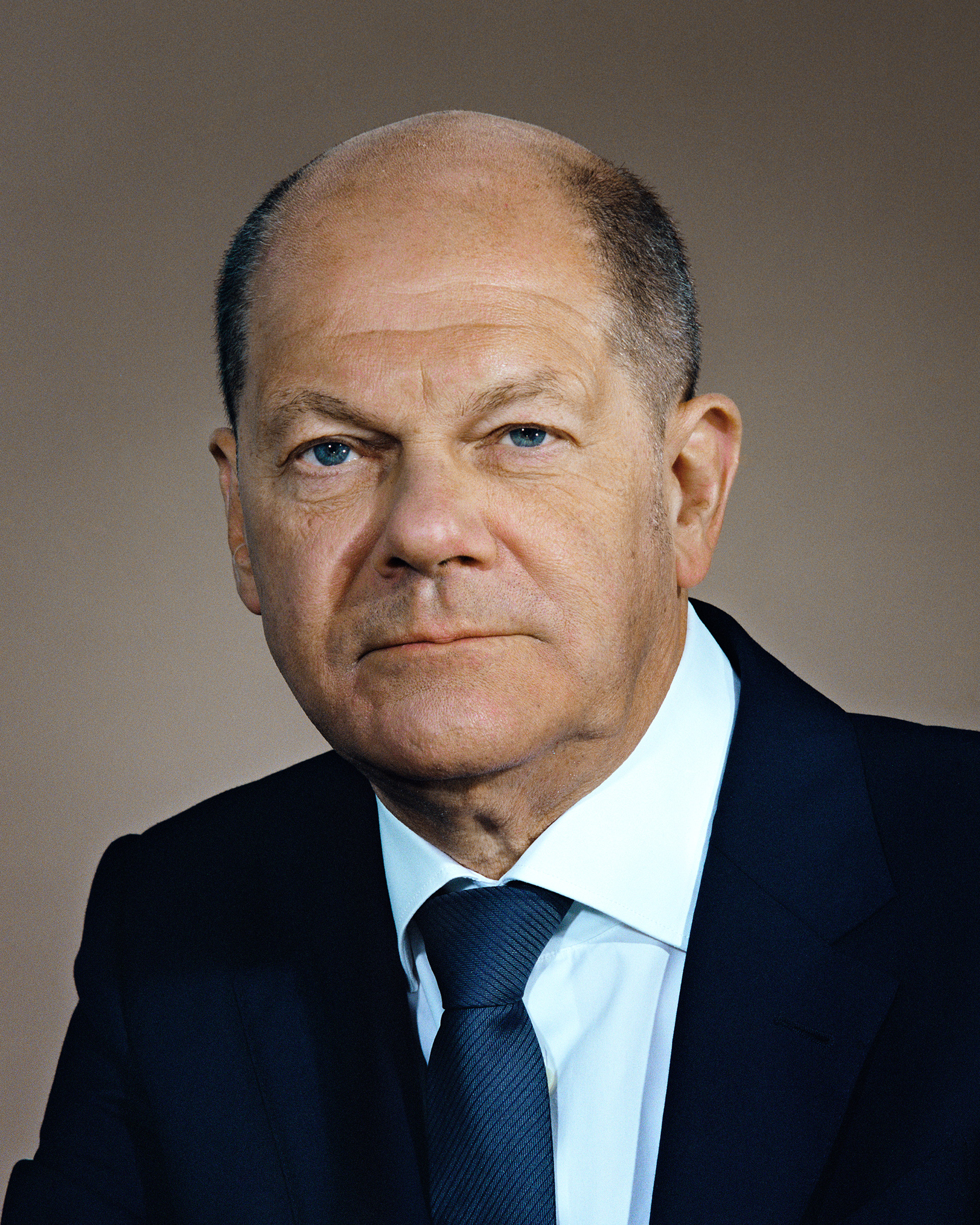Three days after Russia ordered troops into Ukraine, German Chancellor Olaf Scholz stood before the Bundestag, the federal Parliament in Berlin, and addressed the lawmakers in a special Sunday session. “Feb. 24, 2022, marks a watershed moment in the history of our continent,” he said, calling the Russian invasion a Zeitenwende, an epoch-changing event.
Scholz, who had taken office only a couple of months earlier, met this historic moment with a response that would overturn decades of military policy—and with it, a crucial part of postwar German identity. He announced a €100 billion plan to boost the country’s notoriously depleted armed forces, promised to end reliance on Russian fossil fuels, and, for the first time since the Second World War, declared Germany would send weapons to a conflict zone. “The issue at the heart of this is whether power is allowed to prevail over the law,” Scholz told his Parliament, “or whether we have it in us to set limits on warmongers like Putin.”
Exactly what those limits should be—and how quickly Germany should impose them—has been the subject of fierce debate in the two months since. For decades, Germany has been an economic powerhouse with a military that lagged behind, embracing pacifism in atonement for the Holocaust and other devastations it caused in the 20th century. With his Zeitenwende speech, Scholz presented a road map for Germany to emerge as a true global power—with a military to match. “We have to be strong enough. Not so strong that we’re a danger to our neighbors,” Scholz says, during an April 22 interview with TIME, his first with a major English-language publication since the start of the war. “But strong enough.”
The announcement of this new era for Germany was met warmly by allies around the world, many of whom had complained about Germany’s hesitancy in the run-up to the invasion. And though the speech raised questions at home, the three parties in his coalition quickly swung into line, as did the broader public: a March 1 poll for the broadcaster RTL found that 78% of Germans supported Scholz’s plan to send weapons to Ukraine and fund improvements to the German army. “It was a really great moment,” chair of the Bundestag Defense Committee Marie-Agnes Strack-Zimmermann says of the speech. “And then it went quiet.”
Quiet is Scholz’s hallmark trait. A reserved man who, as his biographer Lars Haider puts it, “deliberately does not answer questions directly,” Scholz has yet to find his political rise impeded by his apparent reluctance to explain himself. But in this moment of historic crisis, when the future not just of Ukraine but of the entire European order hangs in the balance, his subsequent reticence inflamed critics at home and abroad, turning the expectations raised by the Zeitenwende speech to widespread frustration.
A weekly newsletter featuring conversations with the world’s top CEOs, managers, and founders. Join the Leadership Brief
When it comes to military and financial aid, the international perception has been that Europe’s largest economy is shirking its responsibilities at a time when smaller nations, from Poland to Estonia, are stepping up to provide hefty donations of money and weapons. As Russian troops mounted on Ukraine’s border in late January, Germany offered to send some 5,000 helmets—but not arms—to Ukraine, prompting Kyiv mayor Vitali Klitschko to ask, “What will they send next? Pillows?” It was only in late April, after weeks of conflicting deflections, that Scholz answered Ukraine’s pleas and agreed to send heavy weapons directly.
And then there is the matter of imported Russian oil and gas. Not even the killing of hundreds of civilians in Bucha or the brutal siege of Mariupol—which Scholz calls “immoral crimes”—persuaded the Chancellor to implement an immediate embargo on Russian fossil fuels.
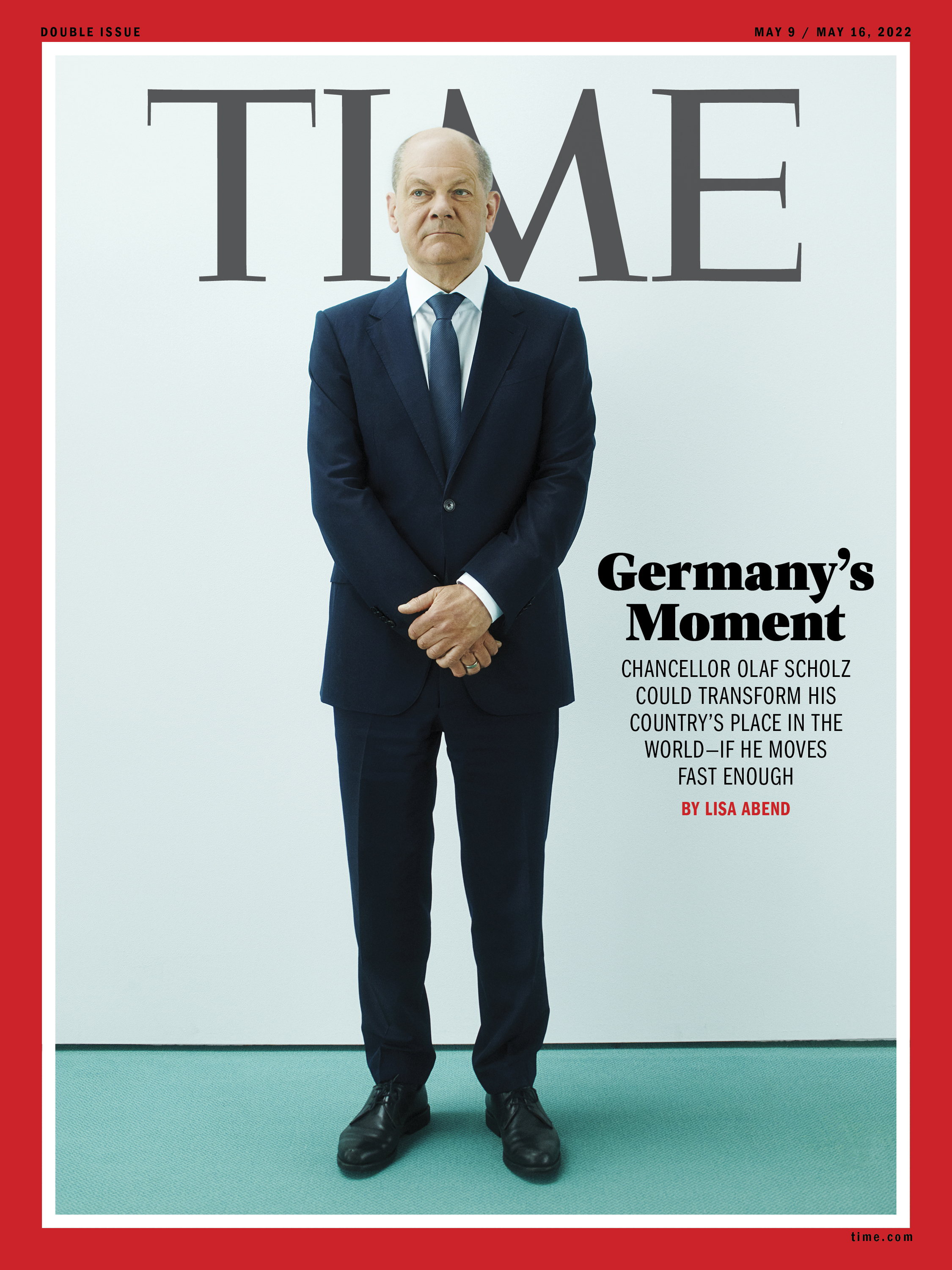
When Germany announced on April 26 that Gepard tanks would soon be rolling across Ukraine—a rare delivery of heavy weapons systems from a Western nation’s own stockpile—the decision was cast by many as the Chancellor caving to criticism from allies. But when he spoke with TIME four days earlier, Scholz seemed immune to pressure, calmly maintaining instead that he was committed to the promises of the Zeitenwende speech and was working as quickly as possible in tandem with Germany’s allies—and trying to avoid a dangerous escalation in hostilities.
In his view, he has been entrusted by the German people to lead based on what he believes—and not what polls say—is right for the country. “If you are a good leader,” Scholz says, “you listen to the people, but you never think they really want you to do exactly what they propose.”
On the winter day in 2021 that Chancellor Angela Merkel’s 16 years in power came to an end and Scholz took office, his father told a reporter that his son was just 12 years old when he declared he wanted to become Chancellor. It’s not hard to believe; Scholz joined the center-left Social Democratic Party (SPD) while he was still in high school. After practicing law for several years, he entered the Bundestag in 1998 and soon rose through the party ranks, becoming general secretary in 2002.
Read More: What Will Germany’s Biggest Military Since World War II Look Like? No One Knows
Although he left Parliament for a successful seven years as mayor of Hamburg, the city where he grew up, he returned in 2018. He was serving as Vice Chancellor and Finance Minister in the “grand coalition” government that Merkel’s Christian Democratic Union (CDU) had formed with the SPD when she announced she would be retiring in 2021. Scholz lost his initial bid to become party leader, but his robust response to the COVID-19 pandemic as Finance Minister—as well as a simple campaign theme of “respect” that resonated with working-class voters—helped him regain the top spot and, with it, the chancellery. If it’s daunting to fill the shoes of a leader in power for so long that she was affectionately nicknamed “Mutti,” he doesn’t admit it.
Like his predecessor, Scholz is tightly guarded about his personal life. Over the course of two hours with TIME, he divulges few details: he played the oboe as a child, he didn’t have an Easter break because of the war, and he took up running in his 40s on the advice of his wife, fellow SPD politician Britta Ernst. He otherwise spends what little free time he has reading history books and newspapers. Government spokesperson Steffen Hebestreit jokes that he rarely has to give his boss a press review in the morning: “When he comes in, he’s already read everything.”
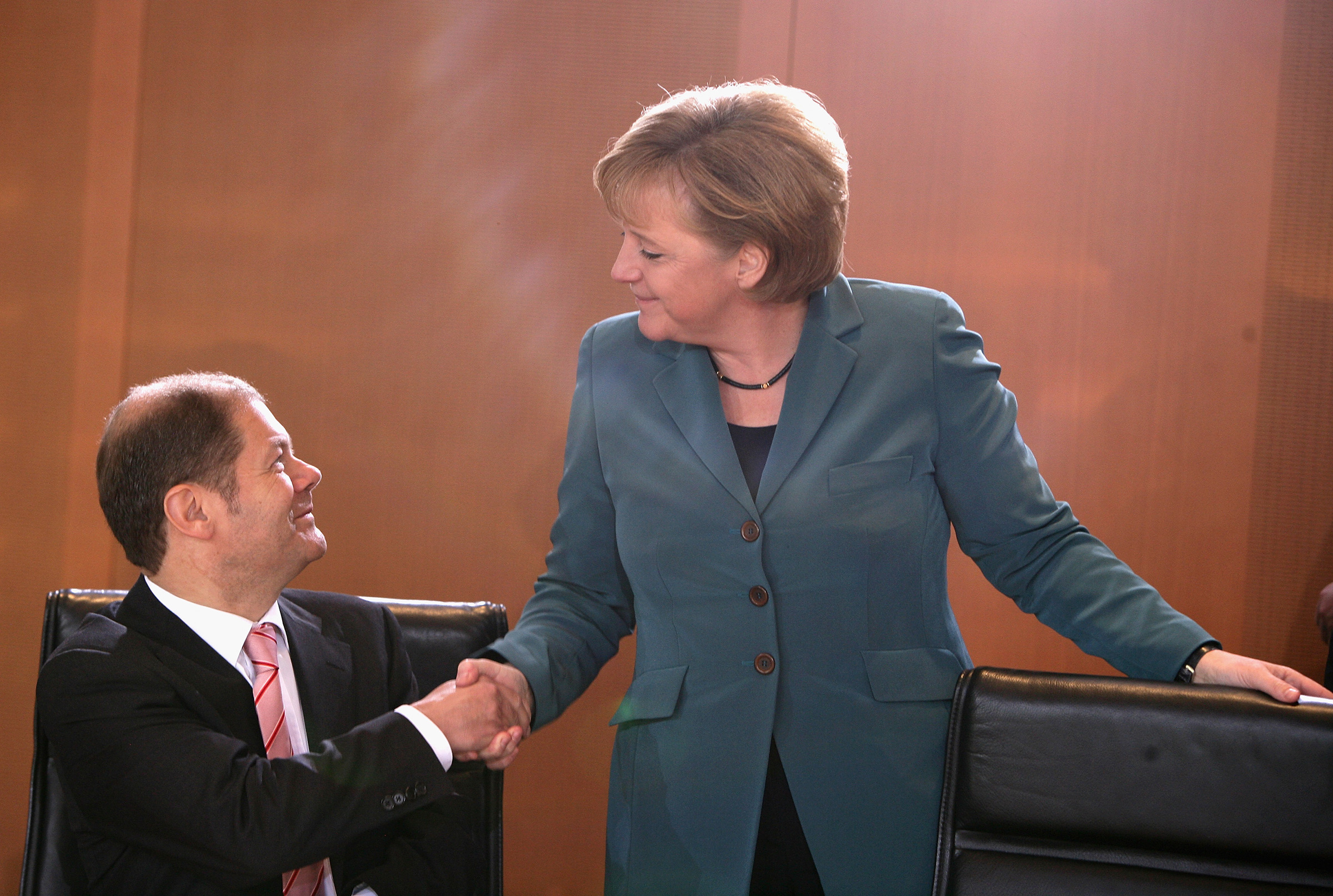
If the media’s heavy criticism of his handling of the war makes for a tough morning the day we meet, the Chancellor doesn’t show it. That’s perhaps just the nature of a man who, according to Hebestreit, lives by two rules: don’t get hysterical, and don’t get offended. It’s also fitting for a man whose dry communication style earned him the moniker “Scholzomat” (as in: Scholz the automaton). In this, Scholz shares another key similarity with Merkel, Haider says. “He is not a great communicator. He works hard and prefers to speak out only when there is something to say.” If Volodymyr Zelensky is Europe’s great orator, Scholz is his opposite: reserved instead of emotive, methodical instead of spontaneous, and reticent to the point of opacity about his decisionmaking.
From the Archives: TIME’s April 2021 Interview With Volodymyr Zelensky on Russia
His supporters find his combination of work ethic, knowledge, and restraint reassuring. Comparing the Chancellor with his British counterpart, Boris Johnson, SPD lawmaker Adis Ahmetovic observes that while Johnson is “a performer, an entertainer, Olaf Scholz is a leader.” And the Chancellor cites his electoral success as proof that his understated approach works. “The first rule for a politician is to be yourself,” he says. “Leadership needs to be clear, to have a course, an idea about where the country has to go.”
Scholz’s idea of where the nation should go is, of course, shaped by where it has been. “Living in Germany, you can’t go away from the disasters of the first half of the 20th century, which were caused by Germany. It is in all the things we do politically, and it is in my mind too because we have a historic responsibility to help secure peace.” For Germany, that means learning to think beyond itself to the broader collective. “We should be the nation that is willing to find the European solutions that are good for all, not just for our country.”
In the weeks before Russian forces entered Ukraine, Scholz was criticized for not doing enough. Behind the scenes, he says, he was preparing to respond to a Russian invasion. On Feb. 15, the Chancellor flew to Moscow in a last-ditch attempt to avert war. Describing that meeting as a “very bad experience,” Scholz says he pushed back as Putin expounded on his ideas of a “greater Russia.” “I was saying: ‘Please understand, if politicians start to look at history books for where borders were before, we would be at war for hundreds of years.’”
Younger Europeans might take for granted the international order that has allowed for decades of stability on a continent marred by centuries of bloodshed, but the 63-year-old Chancellor grew up in a divided Germany and believes deeply in the importance of the European Union, NATO, and the principles of sovereignty and territorial integrity that underpin those alliances. Nine days after Scholz’s Moscow trip, Putin ordered troops into Ukraine and shattered that rules-based order. “The invasion is a really severe injury to European peace,” Scholz says, gesturing for emphasis. “We are fighting for Ukraine’s sovereignty. No country is the backyard of another; this is an imperialistic view of politics. And this is why we had to react as strongly as we did.”
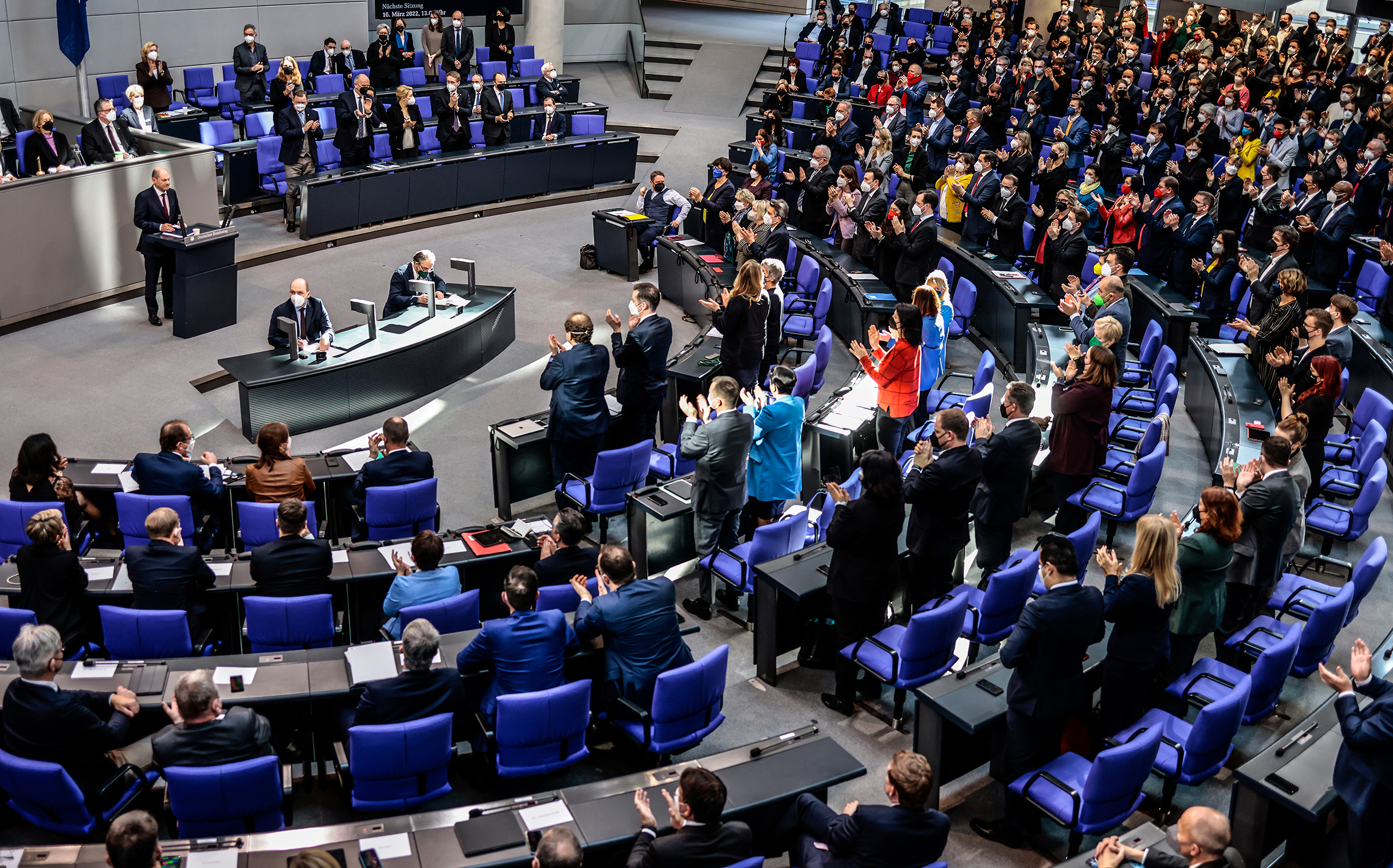
A shift away from the pacifism that had defined decades of policy may have been seismic for Germany, but critics say Scholz’s follow-through has been too hesitant. “We Germans are sleeping,” Thomas Erndl, deputy chairman of the Bundestag’s committee on foreign affairs and a member of the opposition, told TIME on April 25, “while the U.S. is taking a leadership role and Eastern European countries are taking a leadership role.”
By the end of March, Germany had supplied Ukraine with just €1.2 million of military aid— none of it in heavy weapons—while tiny Estonia had managed to come up with €2.2 million. (When pressed, Scholz notes that as Europe’s largest economy, Germany contributed a major share to the E.U.’s €1.5 billion military aid package.) After the atrocities in Bucha emerged in early April, leading members of Scholz’s governing coalition began pushing harder for the delivery of heavy weapons. The pressure increased on April 20—and threatened to blossom into a full-blown scandal—when the newspaper Bild revealed that a list of available weapons submitted by the defense industry at the end of February had not been turned over to Ukraine until April, and with about half the original options removed even then.
Read More: A Visit to the Crime Scene Russian Troops Left Behind at a Summer Camp in Bucha
Scholz insists that Germany’s deliveries are perfectly aligned with those of its allies. How, then, would he explain the criticism leveled at his government? “That is perhaps a good question for you to answer,” he replies, with a tiny, sphinxlike smile. In recent weeks, Berlin has begun ramping up its support for Ukraine. On April 15, it doubled an existing €1 billion military support fund for foreign nations, most of which will go to Kyiv. On April 26, Berlin announced it would send about 50 Gepard anti-aircraft cannon tanks, its first direct delivery of heavy military equipment to Ukraine. And on May 11, 60 Ukrainian soldiers began training on howitzers at a German artillery school, with Germany pledging to send seven of the self-propelled weapons to Ukraine.
For weeks leading up to this pivotal moment, however, the chancellery had offered contradictory explanations for why it wasn’t doing more. Scholz insists that these were not delay tactics and that he was simply taking the time necessary to avoid unnecessarily escalating German engagement in isolation. “There will be no activity of Germany that is not absolutely part of the activities of our allies,” he says.
But the perception of Scholz’s heel-dragging has led to some international kerfuffles. German President Frank-Walter Steinmeier’s planned trip to Ukraine was canceled amid a diplomatic standoff over his past statements of support for the Nord Stream 2 gas pipeline, resulting in the Ukrainian ambassador to Germany calling Scholz an “offended liverwurst.” Meanwhile, German opposition leader Friedrich Merz took up the statesman role when he visited Irpin and Kyiv in early May and met with Ukrainian President Zelensky. (Zelensky has since invited Scholz and Steinmeier to Kyiv.)
Meanwhile, Germany’s payments to Russia continue. In February, Scholz halted his country’s €10 billion Nord Stream 2 project, which had been designed to double the flow of Russian gas into Germany. But he has refused to impose an immediate embargo on the import of Russian fossil fuels. “We are implementing sanctions that will hurt Russia,” he says. “But not hurt us more than they do the Russians.”
Cutting off Russian fossil fuels would definitely hurt. With few energy resources of its own, Germany relies heavily on imports, and in 2021 got roughly 50% of its coal, 34% of its oil, and 55% of its natural gas from Russia, according to energy think tank Agora Energiewende. Although it has reduced that significantly since the start of the war—slashing the share of Russian imports to 8% for coal, 12% for oil, and 35% for natural gas—it is still among the most dependent large economies in Europe.
Read More: Germany Can’t Rely on Russian Energy. It Doesn’t Know What to Do Instead
Berlin ignored warnings from the U.S. and the Baltic states about that dependency—which only expanded after Russia’s annexation of Crimea in 2014. Developing closer ties with Russia had been a priority for a succession of chancellors, with its roots in Willy Brandt’s Ostpolitik—or “east policy”—which sought stability through engagement with Russia and helped Germany atone for its postwar guilt. (As many as 24 million Soviets died in World War II.) Over time, that belief in change through engagement morphed into one that held that the best way of assuring geopolitical security was to tie Russia into a mutually beneficial trade relationship. Germany got cheap oil to fuel its booming industry, while Moscow gained political influence, most notoriously with former Chancellor Gerhard Schröder, who sits on the boards of multiple Russian energy companies.
Scholz is clear that the era of interdependence is coming to an end, but he takes the long view. “We are preparing for getting out of the situation,” he says, with emphasis on the preparing. In line with sanctions that the E.U. imposed, Berlin plans to phase out Russian coal by the end of summer, and on May 1, Economy and Climate Minister Robert Habeck said he expects Germany could be fully independent of Russian crude oil imports within the same time frame.
Cutting off natural gas will take longer, due to the need to build the infrastructure to transport and store alternative fuel sources, which are fewer. Scholz notes that Germany is working hard to quickly build that infrastructure—and that once it does, as part of its green transition, there is no going back. “Russia really misunderstands the intensity and the earnestness with which we are working on getting rid of the necessity to import any fossil fuels.”
Read More: How Germany’s New Government Plans to Be the Greenest One Yet
And for now, Scholz is following the lead of Germany’s industry, which warns that an abrupt cutoff would lead to factory closures and mass unemployment. On April 22, the Bundesbank, Germany’s central bank, reported that an energy embargo now would cause the German economy to contract 5% over predictions for 2022 and provoke one of the deepest recessions in decades. That amount roughly corresponds to the 4.6% that the German economy shrank in the first year of the pandemic, which helps explain why many economists conclude that such a contraction would be manageable—especially if the government applies some of the same tools it did during that crisis. “There would be a recession and there might be some scarcity,” says Veronika Grimm, an economist at the University of Erlangen-Nürnberg who sits on the council of economic experts advising the Berlin government. “But it would not be a catastrophe.”
Scholz’s rejection of an immediate embargo, coupled with his characteristic reluctance to explain himself, has left some wondering if the German political elite remains conflicted over how to handle Moscow. But when pressed on whether he envisions some kind of rapprochement with Russia, Scholz concedes that there is no going back. While Russia will remain, as he puts it, “a reality” with which Ukraine will have to reach an agreement for peace, “There will never be a special relationship between Germany and Russia that is not the European relationship with Russia.”
There is no doubt that under Scholz, Germany has made a dramatic about-face. “A few weeks ago, hardly anyone could have imagined that Germany would deliver weapons to a war zone at all; today they should be as heavy and effective as possible,” says Haider, who sees the German tendency to think in absolutes as part of the reason many believe Scholz isn’t doing enough.
But the other part is a communication problem. “We are not telling the story,” defense committee chairwoman Strack-Zimmermann says. “We must explain what is happening in Ukraine and what it means to Germans and to Europe. We must explain to our allies what we are doing with weapons. And OK, he’s a quiet guy. But he needs to talk.”
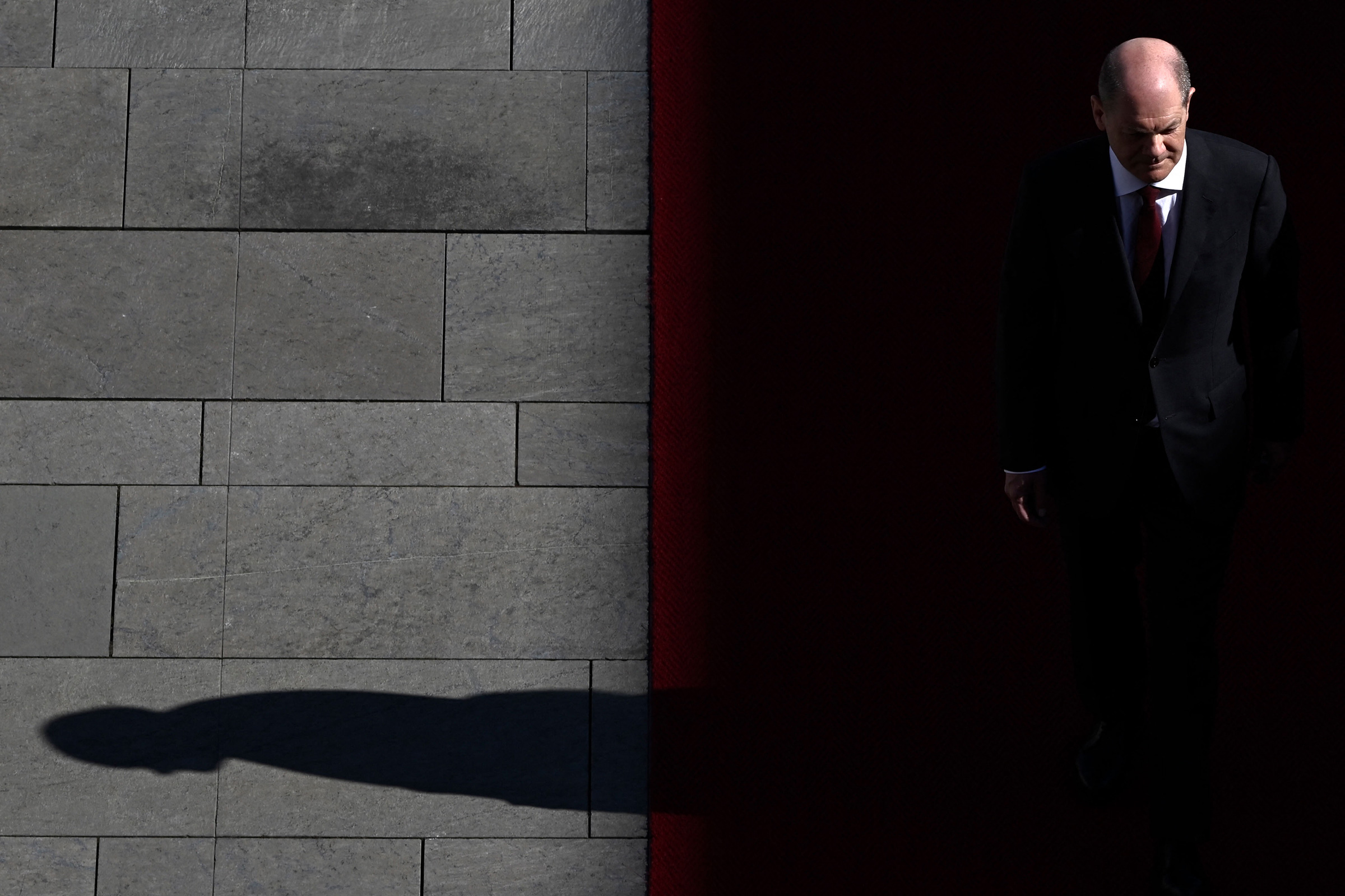
Claudia Major, an analyst at the German Institute for International and Security Affairs, argues that the lack of communication also impedes Scholz’s ability to bring about a real Zeitenwende at home. “To change the way a country behaves in security and defense policy—and this is what was announced in the speech—takes years,” she says. To pull it off, “you would need a long-term implementation plan for constant explanation on why the world has changed, how it has changed, and what needs to be done about it.” Without regular and clear explanation of policies, she adds, the rest of the world is left wondering whether Germany can’t do something—or whether it just doesn’t want to.
And without a narrative, not even actions might register. On May 8, the Chancellor’s SPD suffered a crushing defeat in elections in the northern German state of Schleswig-Holstein. The SPD slumped to third place, dropping more than 11 percentage points from the last elections in 2017—a worrying sign for Scholz and his party.
It seems that the Chancellor is now realizing the importance of not just leading but communicating. During a rare TV address on May 8 to mark the 77th anniversary of the end of World War II in Europe, Scholz spoke of the role Germany had to play now. “We support Ukraine in the fight against the aggressor. Not doing so would mean capitulating to sheer violence—and empowering the aggressor,” he said. But he also acknowledged that his government was “not simply doing all the things that some people are calling for.”
It’s a sentiment he expressed in our conversation a few weeks earlier: that Germans themselves are conflicted on the best course of action. “As a politician, I always have this feeling of two hearts in your breast,” he says. On the one hand, people urge him to do everything he can to stop Russian aggression. On the other, they want him to avoid any escalation.
And because they understand that there are tough decisions to be made, they look to those who lead them. “I trust the people,” Scholz says. “And I’m sure they trust that we will do the job of thinking through all the difficult things.”
—With reporting by Simon Shuster/Berlin, Eloise Barry/London, and Leslie Dickstein/New York
More Must-Reads from TIME
- Inside Elon Musk’s War on Washington
- Meet the 2025 Women of the Year
- The Harsh Truth About Disability Inclusion
- Why Do More Young Adults Have Cancer?
- Colman Domingo Leads With Radical Love
- How to Get Better at Doing Things Alone
- Cecily Strong on Goober the Clown
- Column: The Rise of America’s Broligarchy
Write to Naina Bajekal/Berlin at naina.bajekal@time.com
